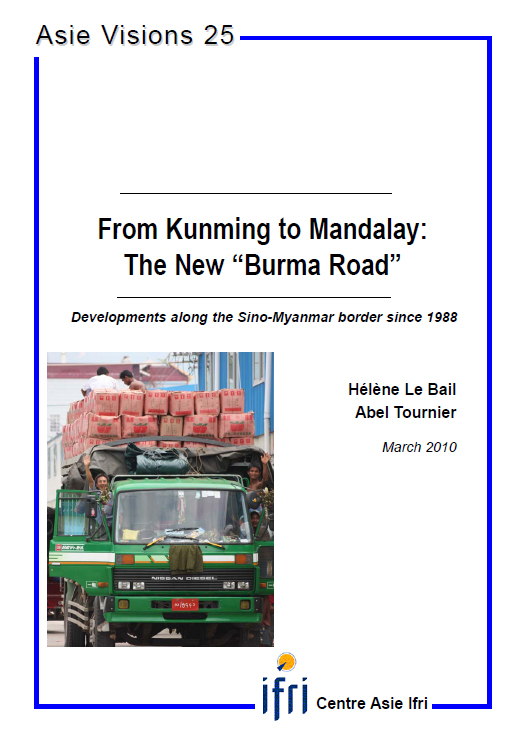From Kunming to Mandalay: The New "Burma Road". Developments along the Sino-Myanmar border since 1988

The present paper aims to describe the vitality and complexity of bilateral trade along the Sino-Myanmar border.
Three aspects have been emphasized. Firstly, the booming of cross-border commercial exchanges must be understood within a larger strategic framework. The connection between the two countries is motivated by economic and security interests: energy security, access to raw materials, cooperation for regional development and (for China) opening up of inner provinces.
Secondly, an analysis of the political and demographic situations in the border areas is important to understand trafficking activities, but also to understand thriving exchanges and the mobility of people. The second part of this paper describes the frontier area in detail.
Finally, this paper underlines the key role of the Sino-Myanmar population (even if they are not the only actors of the trans-border trade). Today's renewal of Chinese identity and community life in Myanmar is both a factor and an effect of thriving bilateral relations.
Download the full analysis
This page contains only a summary of our work. If you would like to have access to all the information from our research on the subject, you can download the full version in PDF format.
From Kunming to Mandalay: The New "Burma Road". Developments along the Sino-Myanmar border since 1988
Related centers and programs
Discover our other research centers and programsFind out more
Discover all our analyses
RAMSES 2024. A World to Be Remade
For its 42nd edition, RAMSES 2024 identifies three major challenges for 2024.

France and the Philippines should anchor their maritime partnership
With shared interests in promoting international law and sustainable development, France and the Philippines should strengthen their maritime cooperation in the Indo-Pacific. Through bilateral agreements, expanded joint exercises and the exchange of best practices, both nations can enhance maritime domain awareness, counter security threats and develop blue economy initiatives. This deeper collaboration would reinforce stability and environmental stewardship across the region.

The China-led AIIB, a geopolitical tool?
The establishment of the Asian Infrastructure Investment Bank (AIIB) in 2016, on a Chinese initiative, constituted an attempt to bridge the gap in infrastructure financing in Asia. However, it was also perceived in the West as a potential vehicle for China’s geostrategic agendas, fueling the suspicion that the institution might compete rather than align with existing multilateral development banks (MDBs) and impose its own standards.
Jammu and Kashmir in the Aftermath of August 2019
The abrogation of Article 370, which granted special status to the state of Jammu and Kashmir (J&K), has been on the agenda of the Bharatiya Janata Party (BJP) for many decades.






